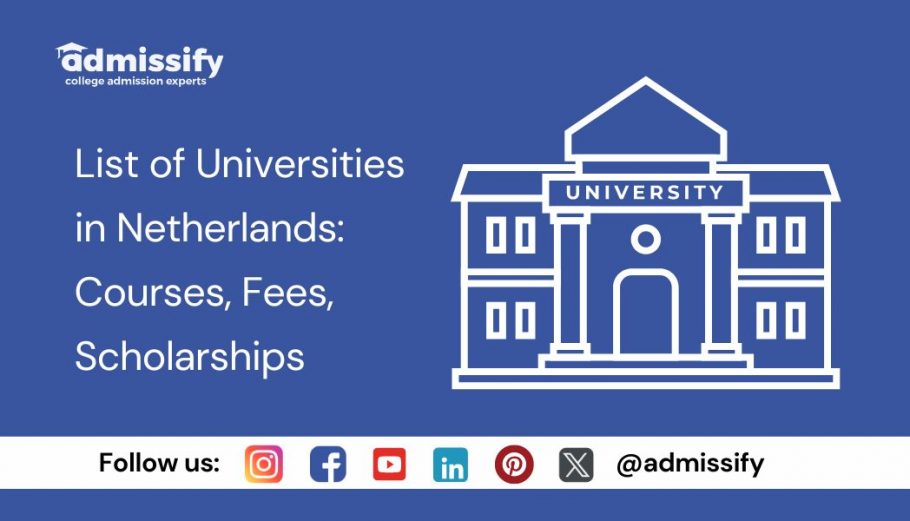Last Updated on August 30, 2024
Studying in Netherlands is easy, as more than 17 million people are there. The Netherlands is a developed and diverse country. It is a popular destination for students looking to study abroad. Studying in the Netherlands is the preferred option for international students. Every year, the country welcomes international students from more than 150 countries, providing them with a high-quality education and numerous job opportunities. Let us look at all aspects of studying in Netherlands through the eyes of international students.
Study in the Netherlands Highlights
Key highlights to study in the Netherlands are:
| Universities in the Netherlands | 55+ |
| Average Living Expense | €850 to €1,100 (monthly) |
| Popular Courses in the Netherlands | MIM in Netherlands | MBA in Netherlands | BBA in Netherlands | Engineering in Netherlands |
| Part-time Work Allowance | up to 20 Euros (hourly) |
| Post-study Work permit in the Netherlands | 12 months |
| Netherlands Study Visa cost | 210 Euro |
Intakes in the Netherlands to study
The Netherlands University accepts applications for enrollment in two intakes of students seeking higher education. They’re a list of things.
- September intake: Since September is a significant intake for Dutch institutions, you should try to get admitted during this time. Classes begin in September. Many universities also allow early applications for this intake, which can be advantageous in some circumstances.
- February intake: This intake benefits people who turned away from the September initial intake and begin classes in February. There is much less rivalry for the second intake than for the first, which is a benefit in and of itself. Permission to Work After Study in the Netherlands.
The educational system in the Netherlands allows several work options and high-quality study programs offered by the Dutch school system. After graduating from one of the Dutch universities, international students are granted a post-study work permit. International graduates must get the “zoekjaar,” or search/orientation year, to be permitted to work after graduation. Three years after finishing their degree program, students must apply for this permission, citing new regulations that went into effect on March 1, 2016. Additionally, graduates of the world’s top 100 universities request this visa to work productively in the Netherlands.
Top Universities in the Netherlands
The Netherlands’ universities are well-known for their high rankings in higher education worldwide. Every year, international students submit applications for undergraduate and postgraduate programs. The ranking of Dutch universities is based on their research performance and ratings from members of the academic community around the world and in Europe. Below is a list of the top global universities in the Netherlands for 2025.
Some of the best universities in the Netherlands for international students are listed below:
| University Name | QS World Rankings 2024 | Times Higher Education Rankings 2023 |
| Delft University of Technology | #47 | #70 |
| University of Amsterdam | #53 | #60 |
| Utrecht University | #107 | #66 |
| Eindhoven University of Technology | #124 | #201-250 |
| Leiden University | #126 | #77 |
| University of Groningen | #139 | #75 |
| Wageningen University and Research Center | #151 | #59 |
| Erasmus University Rotterdam | #176 | #80 |
| Vrije Universiteit Amsterdam | #207 | #121 |
| Radboud University | #222 | #139 |
Best Engineering Universities in the Netherlands
Based on QS Subject Rankings 2023, some of the best universities in the Netherlands for Engineering courses are given as follows:
| University Name | QS- Engineering & Technology |
| Delft University of Technology | #13 |
| Eindhoven University of Technology | #124 |
| Utrecht University | #249 |
| University of Groningen | #327 |
| Vrije Universiteit Amsterdam | #396 |
| Leiden University | #401-450 |
Best Art Universities in the Netherlands
Based on the Subject Rankings 2023, some of the best universities in the Netherlands for Arts courses are listed below:
| University Name | QS- Art and Design |
| Utrecht University | #101-150 |
| Erasmus University Rotterdam | #201-250 |
| Delft University of Technology | #251-300 |
Top Medical and Health Sciences Universities in the Netherlands.
According to the QS Subject Rankings 2023, some of the top medicine and health science course universities in the Netherlands are listed below:
| University Name | QS- Medicine Rankings |
| University of Amsterdam | #30 |
| Erasmus University Rotterdam | #39 |
| Utrecht University | #51-100 |
| Leiden University | #51-100 |
| University of Groningen | #51-100 |
| Vrije Universiteit Amsterdam | #51-100 |
| Delft University of Technology | #251-300 |
Top Courses in the Netherlands
Some of the top courses in the Netherlands for international students are given as follows:
| Course Name | Count of Universities |
| MIM | 25 |
| BBA | 23 |
| MS | 19 |
| BE/BTech | 18 |
| BSc | 18 |
| MA | 12 |
| BA | 11 |
| MBA/PGDM | 10 |
| LLM | 9 |
| BJMC | 8 |
Popular Courses in the Netherlands
More than 1,700 bachelor’s, master’s, and other degree programs are offered to students in the Netherlands. Out of ten study subjects, the most common fields to study in the Netherlands are accounting, engineering, health care, social science, law, computer science, and the arts.
Timeline for Admission to the Netherlands Universities
In the Netherlands, universities might choose to have a set intake season or to use rolling admissions, in which case there is no deadline. The academic year is split into two semesters, Summer and Winter when we discuss intake season. Alternatively, candidates can contact our Shiksha Study Aboard counsellors, who focus on helping with university applications.
| Numerus Fixus Programme | 15 January |
| Other Study Programmes | 1 May |
Education loans and Scholarships to study in the Netherlands
In the Netherlands, scholarships are the most effective means of funding your education. The Netherlands provides non-EEA international students with several education loan choices and scholarship opportunities. International students can manage their tuition by applying for merit-based scholarships from Netherlands Universities. International students can also apply for education loans in the Netherlands because major financial institutions offer attractive interest rates, making it quite convenient. The following are some scholarships that are open to students from abroad:
- Holland Scholarships
- Orange Tulip Scholarships
- Radboud Scholarship Programme
Part-time work options in the Netherlands
International students can work part-time in the Netherlands, but they can only work full-time in June, July, and August or up to 10 hours per week throughout the rest of the year. Working part-time can help students better manage the cost of living and studying in the Netherlands. Acquiring Dutch public health insurance is mandatory as soon as you start working, even if it’s part-time.
- In the Netherlands, part-time employment for international students is permitted for 10–16 hours a week.
- Students who work part-time may make up to 20 euros an hour, or about 1,700 Indian rupees.
- Students at the university level have access to a wide range of part-time possibilities, including tutoring, library assistantships, and opportunities with professors.
- Being unable to speak Dutch is not a barrier because administrative and educational settings use English.
Permission to Work After Study in the Netherlands
They can choose from several work options and high-quality study programs offered by the Dutch school system. After graduating from one of the Dutch universities, international students are granted a post-study work permit. International graduates must get the “zoekjaar,” or search/orientation year, to be permitted to work after graduation. Three years after finishing their degree program, students must apply for this permission, citing new regulations that went into effect on March 1, 2016. Additionally, graduates of the world’s top 100 universities request this visa to work productively in the Netherlands.
Wrapping Up!!
The Netherlands is a popular destination for international students seeking quality education and job opportunities. With over 150 universities, students can choose between a set intake season or rolling admissions. Top universities include MIM, MBA, BBA, and Engineering. Living expenses range from €850 to €1,100 monthly, and part-time work allowances are available. After graduating, international students can obtain a post-study work permit. Public universities offer low tuition fees, and students can apply for scholarships and financial aid.
FAQs
How many intakes are there in the Netherlands?
There are two main intakes for international students in the Netherlands: the September intake, which is the primary intake, and the February intake, which is the secondary intake, offering fewer programs and courses.
Can I get a full scholarship in the Netherlands?
Yes, you can get a full scholarship in the Netherlands. Various scholarships, such as the Holland Scholarship and Erasmus Mundus, are available for international students, covering tuition fees and living expenses.
Which universities in the Netherlands have a February intake?
Several universities in the Netherlands offer a February intake, including the University of Amsterdam, Maastricht University, and Tilburg University. These universities provide a range of programs for international students starting in the spring semester.
Which universities are accessible in the Netherlands?
Universities in the Netherlands are only partially free for international students. However, public universities offer relatively low tuition fees, and students can apply for various scholarships and financial aid to help cover costs.

Kanishka Garg specializes in crafting informative content on study abroad education. Her passion lies in simplifying the journey for students through SEO-optimized articles and blogs. Kanishka’s commitment to clear communication and her deep understanding of international admissions processes make her blogs essential for students aiming to gain insights into top universities worldwide. With Kanishka’s blogs, students can confidently get solutions to the complexities of applying to their dream universities and achieve their academic aspirations abroad.




